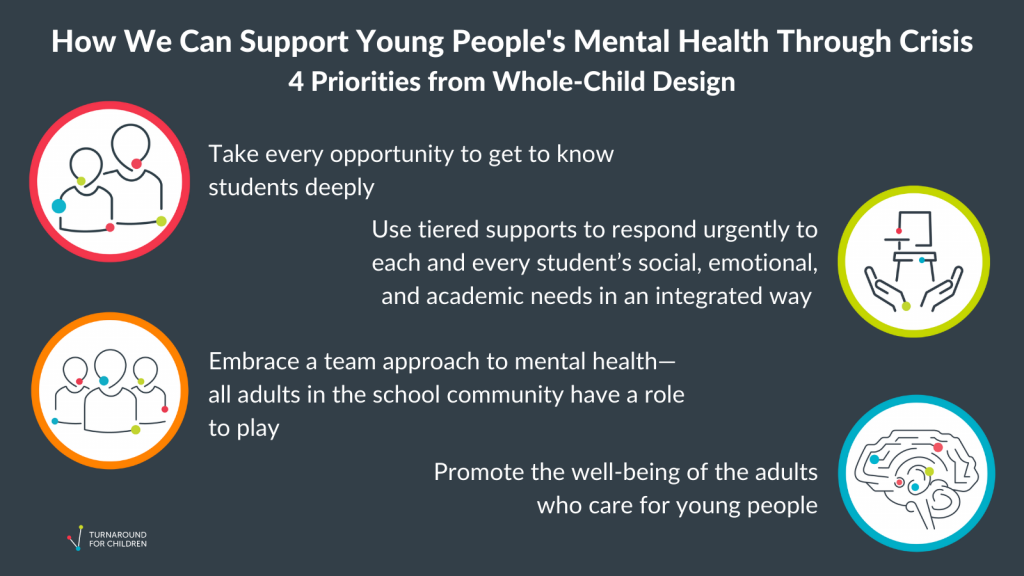Supporting Students and School Communities Through Crisis

ACCESS TOOLS & RESOURCES READ THE BLOG
The American Academy of Pediatrics, American Academy of Child and Adolescent Psychiatry and Children’s Hospital Association have declared a National Emergency in Child and Adolescent Mental Health.
Mental health needs affect a young person’s experience in school and manifest in ways that are emotional, behavioral and cognitive. All learning is tightly intertwined with mental health, physical health, and social and emotional experiences.
To support students and school communities through the current crisis, we should adopt an approach that is both responsive and proactive. We must find ways to meet the urgent needs of today while making a down payment on the long-term changes that are needed to address children’s social, emotional, cognitive, and academic needs, right now and in the future—so they can thrive.
4 Priorities from Whole-Child Design

A whole-child approach to learning and development considers each young person’s social, emotional, academic, and cognitive development holistically. Today, It’s more important than ever to focus on the needs of the whole child: The science of learning and development demonstrates that all learning is integrated—no part of the brain develops in isolation. It would be a false choice to think we can focus on academic recovery without also addressing the critical social and emotional needs of children who have been living through the effects of the pandemic.
- Take every opportunity to get to know students deeply
- Use tiered supports to respond urgently to each and every student’s social, emotional, and academic needs in an integrated way
- Embrace a team approach to mental health—all adults in the school community have a role to play
- Promote the well-being of the adults who care for young people
Tools & Resources
The tools and resources included here can support educators and school staff in addressing each young person’s social, emotional, academic, and cognitive development holistically.
Well-Being Index
 Getting to know students deeply positions adults to better understand and act responsively toward how students are feeling and functioning. Educators can use Turnaround’s Well-Being Index to get a holistic look at how students are feeling and functioning and understand individual student well-being through an equitable whole-child lens.
Getting to know students deeply positions adults to better understand and act responsively toward how students are feeling and functioning. Educators can use Turnaround’s Well-Being Index to get a holistic look at how students are feeling and functioning and understand individual student well-being through an equitable whole-child lens.
The Well-Being Index tools include:
- Online version via Thrively
- Printable versions
- Educator guide
Responding to Students’ Urgent Needs
 Integrated supports should systematically assess students’ comprehensive needs and strengths and coordinate resources in a unified and collaborative way, through a tiered supports system. A critical piece of this system is a crisis plan component that is responsive rather than just reactive, one that allows for students who are experiencing disruptions in their health, mood, behavior, and/or skill development to receive support immediately.
Integrated supports should systematically assess students’ comprehensive needs and strengths and coordinate resources in a unified and collaborative way, through a tiered supports system. A critical piece of this system is a crisis plan component that is responsive rather than just reactive, one that allows for students who are experiencing disruptions in their health, mood, behavior, and/or skill development to receive support immediately.
The crisis support tools include:
- Setting up the Crisis Component
- Making a Crisis Referral
- Collaborative Implementation
- Partnering with a Mental Health Agency
Deeper than Icebreakers: Activities to Know Your Students
Getting to know students deeply positions adults to better understand and act responsively toward how students are feeling and functioning. This tool offers educators three activities to more deeply understand the identities, cultures, and experiences of their students, from a place of openness, respect, and empathy.
Co-Regulating Cues Workbook
Both students and educators are dealing with high levels of stress. Dysregulated behaviors can be a symptom of that increased stress, and can only be mitigated by responding with attunement, understanding, and the co-creation of a strong sense of belonging in the community. This tool helps educators identify their own stress responses, reflect on interactions with students, and create new co-regulation strategies for when things get tough.
Empathetic Listening Strategies
Positive developmental relationships with students aren’t built by just being nice; they’re built through consistent interactions that build trust. Empathetic listening helps support the development of trusting relationships through committed attention, non-judgment, and probing to understand.
Relationships Inventory
Relationships should be at the core of everything we do in schools, because strong relationships can reduce stress—for both children and adults, address trauma, and bolster young people’s belief in themselves and their futures. The Relationships Inventory tool supports educators to reflect on relational aspects of the classroom.
Individualized Relationship Strategies
Students need to believe that the adults at school care about them and are there for them. Educators can use regular interactions they already have with students to learn about the unique strengths and challenges of each student. This tool offers easy-to-implement strategies to strengthen relationships with individual students.

Share